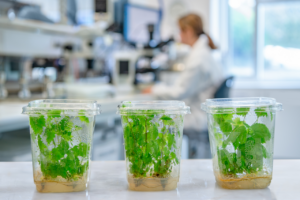The role of Diastaticus in brewing
Unlike typical brewing yeasts, Diastaticus can produce a glucoamylase enzyme. This enzyme enables the breakdown of complex carbohydrates such as starch and oligosaccharides to simple fermentable sugars which results in secondary fermentation in package and spoilage of the beer.
Issues caused by Diastaticus
When contamination in beer occurs, in can cause:
- Over-attenuation: Diastaticus can break down and ferment complex sugars left unfermented by traditional yeasts, leading to higher-than-expected alcohol content.
- Exploding packaging: secondary fermentation in packaged beer can lead to excess carbonation causing the can or bottle to explode, potentially causing harm to people who handle the product, including consumers. Product recalls are necessary to minimise harm and can cause reputational damage to a brand.
- Off-flavours: the yeast can produce undesirable flavours, spoiling the taste of the beer.
Managing Diastaticus
Due to its robust fermentation capabilities, detecting and managing Diastaticus is crucial for brewers. Contamination can be controlled by:
- Rigorous cleaning and sanitation: implement strict hygiene protocols to prevent contamination from brewing equipment and the environment.
- Regular testing: utilise microbiological tests to detect the presence of Diastaticus in brewing yeast and finished beer.
- Control measures: consider using brewing yeast strains that do not produce glucoamylase or apply specific inhibitors to manage Diastaticus activity.
Diastaticus testing
Affinity Labs offers a PCR-based method to detect the presence of Diastaticus in packaged and unfinished beers. Testing will detect the presence of DNA sequences that are highly specific to diastatic yeast, with results obtained within hours of commencing analysis.
Our methodology has been developed and extensively tested to be applicable to a wide range of beer styles, ferment samples and finished beers. The limit of detection of this analysis is 50 cells/mL. Testing is applicable to ferment, brite tank and finished beer samples. Samples can be tested as part of regular routine analysis or if Diastaticus is suspected.
Worried about the presence of diastatic yeast in your brewery? Use the enquiry form to ask us about a diastatic yeast audit of your facilities.

We offer tailored shelf-life testing services to food and beverage producers and suppliers.
This includes:
Lorem ipsum dolor sit amet, consetetur sadipscing
Lorem ipsum dolor sit amet, consetetur sadipscing
Lorem ipsum dolor sit amet, consetetur sadipscing
Lorem ipsum dolor sit amet, consetetur sadipscing
Lorem ipsum dolor sit amet, consetetur sadipscing
Lorem ipsum dolor sit amet, consetetur sadipscing
Lorem ipsum dolor sit amet, consetetur sadipscing
Lorem ipsum dolor sit amet, consetetur sadipscing
Enquire
Articles & case studies

The benefits of agrochemical testing for wine grape growers
Managing the health and productivity of grapevines …
Using consumer acceptance studies to deliver market-ready products
Consumer acceptance studies help manufacturers gai …
How consumer preference studies drive product innovation and customer satisfaction
Consumer preference studies help manufacturers gai …
Grapevine tissue sampling protocol for virus diagnostics
Grapevine viruses can shorten the life of infected …
NOLO spirits – opportunities for continued growth and innovation
Australia’s beverage scene is witnessing a s …Affinity Labs’ NATA-accredited laboratories perform more than 100,000 analyses per year and have serviced the Australian wine industry since 1984. The laboratories deliver high-quality cost-effective routine, export or specialist analyses, whether it is for a single sample or a large batch of samples
Richard Davidson
Project Manager





